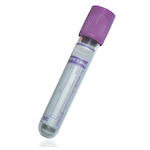Everolimus
Specimen Volume
1 mL whole blood (minimum sample volume 600 uL)Sample Preparation
Turnaround Time
2 working daysSample Processing In Laboratory
Daily (Monday to Friday)Sample Stability
8 days at 4ºCGeneral Information
Everolimus is an immunosuppressant that acts through inhibition of the mammalian target of rapamycin (mTOR), an evolutionarily conserved serine/threonine kinase that plays a central role in the regulation of many cellular functions, including metabolism, growth, proliferation, survival, and memory. Everolimus is extensively metabolized, primarily by CYP3A4, thus its use with inducers or inhibitors of that enzyme may require dose adjustment.
Everolimus is approved for the prevention of transplanted organ rejection and is characterized by a narrow therapeutic window, rather high intraindividual and interindividual pharmacokinetic variability and established drug exposure–response relationships. In the transplantation setting, overexposure to Everolimus may not only cause exacerbation of specific toxicities but also cause excessive immunosuppression likely to affect infection control, whereas very low levels of exposure may result in rejection.
Potential adverse effects of Everolimus treatment include gastrointestinal disorders, hyperlipidaemia, thrombocytopenia, interstitial pneumonitis, oedema, mouth ulcers, impaired wound healing, hepatotoxicity, and nephrotoxicity.
Everolimus concentrations are measured routinely in transplant assessment, although therapeutic targets vary depending on the transplant site and institution protocol. Everolimus TDM is not usually an emergency, because of its long half-life, moderate safety concerns, and potential position as an adjunctive therapy.
Patient Preparation
Trough sample required. Sampling should be standardized to occur within 1 hour before the next dose, which should be taken at the same time everyday and preferably without food. If the latter is not possible for practical or medical reasons, EVR should be dosed consistently with food to reduce fluctuations. Everolimus steady-state concentrations should be monitored 4–6 days after administration of the first dose and after a change in dose.
Reference Range
Reference or therapeutic ranges are not reported as therapeutic target ranges are applied on an individual basis dependent upon specialty, dosing, period in treatment regime and clinical status. Further advice can be obtained from the appropriate speciality.
Specifications
- EQA Status: LGC
- EQAS Scheme: Yes








